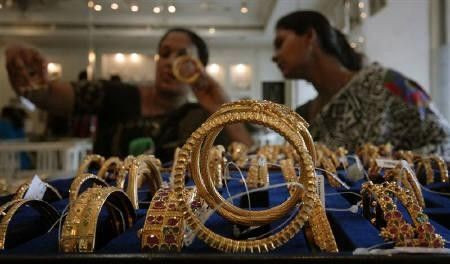Gold Heads for Biggest Weekly Drop Since Early 2009

Gold slipped more than 1 percent on Friday, heading for its biggest weekly drop since March 2009, as stock markets gained and the euro rose after major central banks around the world struggled to contain the debt crisis in Europe.
U.S. Treasury Secretary Timothy Geithner will discuss with European finance ministers the possibility of leveraging the euro zone's bailout fund as the world's main central banks aim to ease dollar funding for stricken banks.
Spot gold fell $21.84 an ounce to $1,766.80 by 0327 GMT after falling 2 percent in the previous session. Bullion struck a record around $1,920 last week on concerns the euro debt crisis could stall global growth.
We favour maintaining our negative trading affair bias in today's trade, Tom Pawlicki, precious metals and energy analyst at MF Global, told Reuters.
Additional pressure will come from low expectations for quantitative easing at next week's FOMC meeting, and from technical factors which argue for a move down to $1,700-$1,750 an ounce in our opinion, he added.
U.S. gold futures fell $8.8 an ounce to $1,772.60 as investors looked to next week's meeting of the Federal Reserve's Federal Open Market Committee on interest rates.
The Fed, facing rising global financial strains and recession fears, is poised to increase downward pressure on longer-term interest rates next week in a bid to accelerate a sputtering U.S. recovery.
Next week's focus could also switch back to the dollar when the FOMC meets, with any hints that policymakers are considering another round of quantitative easing likely to weigh on the currency.
Asian stocks posted early gains on Friday as the relatively stable euro ahead of a European finance ministers meeting reflected hopes for an important policy move to fight the region's debt crisis, which had initially triggered rallies in gold.
We're in a consolidation, a very small one, since the beginning of September. Going forward now, we're probably going to test somewhere the lows that we have seen at the end of August, said Dominic Schnider, an analyst at UBS Wealth Management, referring to gold's correction from highs.
If people are expecting a QE3 right now, they could be disappointed. The hurdle is very high for a QE3.
Many market watchers said the Fed's program of bond purchases through June 30, known as quantitative easing or QE2, helped drive up commodity prices by providing cheap money to investors who placed it in risky assets.
Gold prices are likely to break through $2,000 an ounce by year-end to new record highs, metals consultancy GFMS said in a report Thursday, as inflation pressures in Asia and debt concerns in the West lead to a recovery in investment demand.
The euro clung to gains against the dollar on Friday, boosted by central banks' coordinated action to add liquidity to the European banking system, but the rally is unlikely to last as the Greek debt crisis remains in a critical state.
Oil was headed for a weekly gain on Friday after central banks launched coordinated action to boost European bank funding, easing concern about falling oil demand from industrialised consumers.
© Copyright Thomson Reuters 2024. All rights reserved.





















